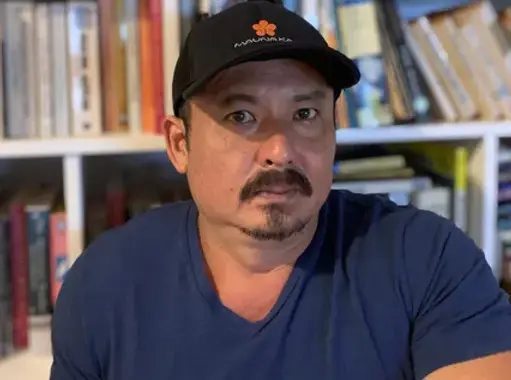TSM: You’ve written across a wide range of genres throughout your career, encompassing both fiction and nonfiction. What drew you to science fiction and neo-noir for your most recent novels, the Water City series?
CM: Like a lot of fiction writers, for years, I wrote my region (Hawaii). The thing is, Hawaii, though rich with culture and history, is relatively small and isolated. I began feeling somewhat cramped. Of all literary genres, science fiction felt the vastest, full of the most possibility, so I just set sail.
TSM: Can you tell us a little bit about your upcoming novel, Eventide, Water City?
CM: Sure. Eventide, Water City is book two of the Water City trilogy. It’s 2150, and the murdered scientist credited with saving the world has left her best friend, an ex-homicide detective, one more big mystery to solve. The problem is that the solution may unravel the world.
 TSM: What has it been like to write a series instead of the collection of mostly standalone books that you’ve written before this?
TSM: What has it been like to write a series instead of the collection of mostly standalone books that you’ve written before this?
CM: In some ways, it’s easier. Setting is firmly established, as are main characters. The challenge is, of course, to keep the setting and characters fresh and interesting, not just to readers, but to me as well. Tasked, unenthusiastic writing is pretty easy to spot. Just read something written by ChatGPT, and you’ll see what I mean (I hope the AI murderbots don’t come after me for saying this).
TSM: What challenges did you find yourself encountering as you took to writing Eventide, Water City? On the flip side, was there anything that you particularly enjoyed about writing this novel?
CM: Because technology has been advancing so quickly, one challenge is anticipating what may be coming in the future and staying ahead of it or inventing an alternative. For example, in the world of Water City, architectural, smart phone, AI, and longevity tech is way better than it is today. The last thing I want to do is make up something that is already dated when the book comes out. I also had to ask myself what doesn’t advance. Not everything does. Technological advancement is notoriously uneven. Facing this challenge is the joy. Being deliberately preposterous is very freeing. Ironically, maybe it’s also the most effective way of predicting the future, too.
TSM: You’ve spoken on your website about creating the world of Water City, and how you were particularly inspired by your favorite novels––One Flew Over the Cuckoo’s Nest and 1984––as well as favorite video games such as Bioshock and Fallout, and childhood films, including the Indiana Jones series. However, you also say that your goal, which you feel you’ve accomplished, is to set Water City apart as its own distinct universe. Did you encounter any moments in your world building process where you found yourself drawing too strongly on one of your influences and had to take a step back to reevaluate?
CM: Melting faces. I seem to always want to write melting faces. The end of Raiders of the Lost Ark did something to my soul when I was a child.
TSM: Speaking of influences, you’ve cited your childhood in rural Hawai’i––particularly the ocean and the socioeconomic inequality––as the strongest factor in everything you write, and spoken of how major events in your life have influenced the characters you’ve created. Is there anything you hope readers will gain from learning about and coming to understand this specific perspective?
CM: Yes. Everything is fusion. It’s easier to see this when you’re a part Korean/Japanese/white kid growing up in a predominantly Native Hawaiian neighborhood in the United States. Most cultures are blends, but I don’t think a lot of people see it that way. Country music, for example, which is associated by most as white American, blends the instruments and sounds of the banjo (African American), the steel guitar (Hawaiian), and the fiddle (European). Everything in the past, everything coming in the future—blends. We’re so hellbent on claiming a thing for ourselves, when in fact, all art and culture is many things, all at once.
TSM: Is there any advice you would give to young or beginner writers that you wish you’d received when you started writing?
CM: If you’d rather be writing something else, write that. I probably should’ve started writing sci-fi ten years before I did, but I came up in an age when literary fiction was the only genre encouraged in MA/MFA programs. It took me years to start writing what I wanted to write instead of what I thought I was supposed to be writing.
TSM: Finally, do you have any upcoming projects we can look forward to?
CM: Book three of the Water City Trilogy, Sunset, Water City, is coming out in December. I’m very excited about that. I’m also editing Honolulu Noir for Akashic Books in Brooklyn, which will be one of the latest installments of their well-known Noir Series. It will probably come out sometime in 2024 or 2025. This interview has been great, by the way. Thanks!

